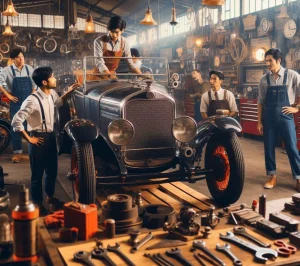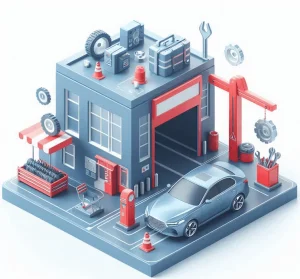Table of Contents
Drag Cars In the world of motorsports, few spectacles can match the raw power and breathtaking speed of Drag Cars. These engineering marvels are designed for one purpose: to unleash unparalleled acceleration over a short, straight stretch of track. From the roar of their engines to the precision of their construction, Drag Cars represent the pinnacle of automotive performance and innovation. Let’s delve into the intricacies of these incredible machines and explore what makes them the kings of straight-line speed.

The Essence of Drag Racing
Drag racing is a form of motorsport that focuses on pure acceleration. The objective is simple: two cars line up side by side, and when the lights turn green, they blast down a straight quarter-mile (or in some cases, eighth-mile) track as quickly as possible. The first car to cross the finish line wins. This seemingly straightforward race format belies the complex engineering and intense preparation required to compete at the highest levels.
The Thrill of Acceleration
The heart-pounding excitement of drag racing lies in its immediacy and intensity. In just a few seconds, Drag Cars can reach speeds exceeding 300 miles per hour, delivering an adrenaline rush like no other. The experience of watching these cars launch from a standstill to blinding speeds in the blink of an eye is nothing short of exhilarating.
The Science of Speed
While the concept of drag racing is straightforward, achieving the incredible speeds seen on the track involves a deep understanding of physics and engineering. Everything from the car’s aerodynamics to its powertrain and chassis must be meticulously designed and tuned to maximize performance. The goal is to extract every ounce of power and efficiency to achieve the quickest possible acceleration.
Engineering Excellence: Building a Drag Car
The Powertrain: Heart of the Beast
At the core of any Drag Car is its powertrain—a powerhouse of engineering designed to deliver maximum horsepower and torque. Most top-tier drag cars are equipped with supercharged or turbocharged engines that can produce upwards of 10,000 horsepower.
Engines
The engines used in Drag Cars are masterpieces of mechanical engineering. They are typically large-displacement V8s or even V10s and V12s in some custom builds. These engines are built to withstand immense stress and operate at the edge of their capabilities. Components like forged pistons, high-strength connecting rods, and robust crankshafts are essential to handle the extreme forces generated during a run.
Forced Induction
Superchargers and turbochargers play a crucial role in boosting engine output. These devices force more air into the engine’s cylinders, allowing for more fuel to be burned and significantly increasing power. Superchargers provide immediate power delivery, while turbochargers offer high power potential at the expense of some lag.
The Chassis: Built for Strength and Stability
The chassis of a Drag Car must be both incredibly strong and lightweight. It needs to withstand the enormous forces generated during acceleration while remaining as light as possible to improve speed and handling.
Frame Construction
Many drag cars use tube-frame chassis made from materials like chromoly steel or aluminum. These materials offer a perfect balance of strength and weight. The chassis design also incorporates safety features like roll cages to protect the driver in case of an accident.
Suspension
The suspension setup on a drag car is uniquely tuned for straight-line performance. Unlike road racing cars, which need to handle turns and varying road conditions, Drag Cars require a suspension that can handle the brutal forces of launch and provide maximum traction. This often includes adjustable coil-over shocks and specialized traction bars.
Aerodynamics: Cutting Through the Air
Aerodynamics play a vital role in drag racing. At high speeds, aerodynamic drag becomes a significant factor, and reducing it can shave valuable milliseconds off a car’s time.
Body Design
The body of a Drag Car is designed to minimize air resistance and maximize downforce. Streamlined shapes, smooth surfaces, and aerodynamic aids like spoilers and diffusers help to keep the car stable and reduce drag. Some drag cars even feature active aerodynamic components that adjust in real-time to optimize performance.
Tires and Traction: Gripping the Asphalt
Tires are perhaps the most critical component when it comes to transferring the car’s immense power to the track. Drag Cars use specialized tires known as slicks, which have no tread and provide maximum contact with the asphalt.
Tire Technology
Drag slicks are made from a soft rubber compound that offers exceptional grip. However, they wear out quickly and must be replaced frequently. The size and pressure of the tires are carefully chosen to ensure optimal traction during the launch phase.
Burnouts
Before a run, drag racers often perform burnouts—spinning the tires to heat them up and lay down a layer of rubber on the track. This improves traction and reduces the likelihood of wheel spin, which can significantly impact acceleration.
The Thrill of Competition
Classes and Categories
Drag racing features various classes and categories, each with its own set of rules and specifications. From the top-tier Top Fuel dragsters to Pro Stock cars and street-legal machines, there is a class for every type of drag racing enthusiast.
Top Fuel Dragsters
Top Fuel dragsters are the fastest and most powerful cars in drag racing. These monsters can produce over 11,000 horsepower and reach speeds exceeding 330 miles per hour. They are the epitome of Drag Cars, showcasing the pinnacle of engineering and performance.
Funny Cars
Funny Cars are another popular class, known for their unique body designs that resemble production cars. They are similar in performance to Top Fuel dragsters but feature full-bodied shells. These cars combine outrageous speed with a distinct visual appeal.
Pro Stock
Pro Stock cars are more closely related to production vehicles, featuring highly modified engines and chassis. They offer a balance between speed and resemblance to street cars, making them a favorite among fans who appreciate the connection to everyday driving.
The Role of Strategy
While sheer power and speed are crucial, strategy plays an essential role in drag racing. Drivers must perfect their launch techniques, reaction times, and gear changes to maximize performance. Every fraction of a second counts, and meticulous preparation can make the difference between victory and defeat.
The Community and Culture of Drag Racing
A Passionate Fan Base
Drag racing boasts a passionate and dedicated fan base. From local tracks to national events, spectators flock to witness the spectacle of Drag Cars in action. The sense of community and camaraderie among fans, drivers, and teams is palpable, creating a vibrant and supportive atmosphere.
Iconic Events
Events like the NHRA (National Hot Rod Association) Nationals and the Street Outlaws series have become iconic in the world of drag racing. These events attract the best drivers and teams from around the world, showcasing the pinnacle of drag racing talent and technology.
The Role of Technology and Innovation
Innovation is at the heart of drag racing. Engineers and teams are constantly pushing the boundaries of what is possible, seeking new ways to extract more power, reduce weight, and improve aerodynamics. Advances in materials science, electronics, and data analytics continue to drive the sport forward, ensuring that Drag Cars remain at the cutting edge of automotive performance.
The Future of Drag Racing
Embracing Sustainability
As the world moves towards more sustainable practices, the drag racing community is also exploring ways to reduce its environmental impact. Electric drag cars are emerging as a new frontier, offering incredible acceleration and the potential for cleaner, quieter racing. These vehicles promise to maintain the thrill of Drag Cars while aligning with broader environmental goals.
Expanding Accessibility
Efforts to make drag racing more accessible are gaining momentum. Grassroots initiatives, entry-level classes, and community programs are encouraging new participants to join the sport. By lowering barriers to entry, the drag racing community is fostering the next generation of racers and fans.
Integrating Technology
The integration of advanced technology, such as telemetry systems and virtual reality simulations, is enhancing the training and performance of drivers. These tools provide valuable insights and allow for more precise tuning and strategy development, ensuring that the sport continues to evolve and improve.
Drag Cars
Drag Cars are more than just machines—they are engineering marvels that embody the pursuit of speed and excellence. The world of drag racing is a testament to human ingenuity, passion, and the relentless drive to push the boundaries of what is possible. From the roar of the engines to the thrill of the race, Drag Cars capture the imagination and deliver an experience like no other.
Whether you are a seasoned racer, a dedicated fan, or someone new to the world of motorsports, the allure of Drag Cars is undeniable. Embrace the adrenaline, marvel at the engineering, and join the vibrant community that celebrates the fastest machines on earth. The world of Drag Cars awaits—unleash your inner speed demon and conquer the track.





More Stories
Exploring the High-Octane World of IndyCar
The Fast and Furious World of Hot Rod Drag Racing
The Need for Speed: Strategies and Secrets of Drag Racing